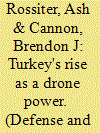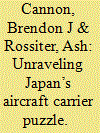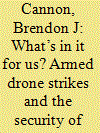|
|
|
Sort Order |
|
|
|
Items / Page
|
|
|
|
|
|
|
| Srl | Item |
| 1 |
ID:
171246


|
|
|
|
|
| Summary/Abstract |
The Middle East and the Horn of Africa exist in two distinct regional security complexes (RSCs), groupings of states exhibiting intense security interdependence within a distinct region, but rarely between regions. Recent geopolitical changes and related analyses, however, point to either a subsuming or a joining of the two RSCs, potentially leading to a high degree of uncertainty in two conflict-prone regions. Given the importance of such developments, we question this theory of RSC expansion by offering a concise review of recent security interactions between the two RSCs as well as quantitatively and qualitatively measuring the material power capabilities of relevant states. Borrowing from and contributing to RSC theory, we also identify and analyse concepts and indicators such as threat perception and sub-regional alliances. Our findings demonstrate the Middle East RSC is not expanding to include that of the Horn of Africa. The two remain distinct and under internal consolidation, despite the current discourse. Rather, high polarity in the Middle East coupled with often-congruent interests in Horn of Africa states best explains the current pattern of their interaction, particularly as Middle East states pursue strategies that further their own security interests at the expense of rival states within their own RSC.
|
|
|
|
|
|
|
|
|
|
|
|
|
|
|
|
| 2 |
ID:
170248


|
|
|
|
|
| Summary/Abstract |
When it comes to states arming themselves, it has become axiomatic among scholars of comparative defence industries that go-it-alone production is no longer an option for most. The processes associated with defence-industrial globalization combined with the ever-rising costs of producing leading-edge weapons systems present huge disincentives for autarky in armaments. Against these strong headwinds, however, India has recently launched, as part of a broader, multi-sector initiative called Make in India, a renewed effort to achieve greater self-reliance in armaments production. This article first places India’s recent defence indigenization efforts within wider discussions about states’ armament strategies and trends in global arms production. Secondly, it contextualizes the drivers behind New Delhi’s latest attempts to transform itself from leading arms importer to major producer (and significant exporter) against the backdrop of past efforts which have yielded little but disappointment. Third, it explicates the main facets of the current strategy for defence-industrial indigenization and gauges its chances for success. To preview the main findings, we argue that self-reliance in armaments via indigenous production will almost certainly continue to allude India because of systemic, structural and technological constraints.
|
|
|
|
|
|
|
|
|
|
|
|
|
|
|
|
| 3 |
ID:
190875


|
|
|
| 4 |
ID:
191047


|
|
|
|
|
| Summary/Abstract |
The reported militarization of the Horn of Africa by Middle Eastern states has generated great interest among scholars and analysts alike. Their analyses and articles about the projections of power from the Middle East to the Horn of Africa are exaggerated, however, because they underappreciate the extant and enduring security burdens of the states in question and overestimate their national power capabilities. This is largely due to common misperceptions and faulty measures of military power. The question that this article answers is therefore not whether states such as Turkey or the United Arab Emirates (UAE) could redeploy limited military resources extra-regionally, but why would they and for how long? Using empirical data from interviews, defence statistics and data from recent deployments of the UAE and Turkey, we show how these key players are inhibited from prospective, long-term, and sustained deployments extra-territorially. This is supported by our analysis of the two states’ power capabilities (latent and actual) and their security burdens that constrain and limit options for the use of military tools abroad in the pursuit of foreign policy aims. This has led both Turkey and the UAE to engage in various forms of remote warfare involving local partners, allied militias, and mercenaries.
|
|
|
|
|
|
|
|
|
|
|
|
|
|
|
|
| 5 |
ID:
191020


|
|
|
|
|
| Summary/Abstract |
The Rwanda Defence Force recently staged military operations against insurgents in Mozambique and the Central African Republic. Both actions were performed outside regional or multinational efforts. This makes the contemporary actions of Rwanda outliers in the international relations of Sub-Saharan Africa and heralds shifts in conflict management on the continent. An explanation is found in the application of neoclassical realist theory to the case of Rwanda – a first – as the country’s leaders have taken advantage of a permissive strategic environment, high clarity, leaders’ beliefs and a strategic culture to produce the output of extra-regional military deployments.
|
|
|
|
|
|
|
|
|
|
|
|
|
|
|
|
| 6 |
ID:
160218


|
|
|
|
|
| Summary/Abstract |
Kenya’s decision to close the Dadaab refugee camp complex highlights structural flaws in the international refugee regime. While much attention has been paid to Kenya’s reasoning, less has been given to the reactions of organisations and states. Given the state’s primacy in the international system and uncertainty about refugees, Kenya’s decision is perhaps unsurprising. It is contended that the stakeholders were unprepared because of path dependence and disbelief that Kenya would repatriate the refugees. While stakeholder reactions arguably demonstrate concern for refugees, the international refugee regime remains unquestioned, sustaining revenue streams that may fuel corruption, encourage lengthy encampment and prolong conflict.
|
|
|
|
|
|
|
|
|
|
|
|
|
|
|
|
| 7 |
ID:
185356


|
|
|
|
|
| Summary/Abstract |
Turkey's production and operational use of its own armed drones has grabbed much media attention and caused consternation in some regional capitals. Not only has Turkey emerged as one of the world's most prolific users of largely indigenously built armed drones but it has also become a major exporter of these systems. Analyses put Turkey's position as a major drone power down to long-term strategic calculation. Whilst Ankara's emergence as a serious drone player is certainly no accident – it is the output of a concerted state effort – this article emphasises how Turkish political-military leaders have absorbed military and political lessons from early forays into armed drone usage and adjusted foreign policy and military tactics accordingly. Such a non-linear evolution of its drone strategy suggests future change in how Turkey seeks to derive benefits from this niche capability.
|
|
|
|
|
|
|
|
|
|
|
|
|
|
|
|
| 8 |
ID:
188202


|
|
|
|
|
| Summary/Abstract |
Japan’s decision to convert two helicopter-carrying ships into fixed-wing aircraft carriers has generated criticism on two fronts. Military analysts question the military sense of carriers in the age of long-range precision missiles, while other domestic critics decry the move as a flagrant breach of Japan’s constitutional constraints on possessing senryoku (war potential) and one likely to provoke Japan’s neighbors, most notably China. Against this backdrop of criticism, why did the administration of Prime Minister Shinzo Abe take Japan back into the difficult business of carriers? This article argues that contrary to stated criticism, the carrier conversion program does provide Tokyo with tangible military benefits but these on their own are insufficient to explain the decision. Instead, we show the move is motivated in part by the desire to leverage carriers’ symbolic value for political ends.
|
|
|
|
|
|
|
|
|
|
|
|
|
|
|
|
| 9 |
ID:
172571


|
|
|
|
|
| Summary/Abstract |
Strikes conducted by the US using armed unmanned aerial vehicles (UAVs) against the terrorist group al-Shabaab have received widespread attention documenting the number of strikes, the reactions of the local Somalis, and the disparity between AFRICOM and local reporting. Using interview data from individuals in Mogadishu, Nairobi and elsewhere in the region, this article provides a counterpoint to previous studies by measuring the Federal Government of Somalia’s (FGS) reliance on the US drone campaign in Somalia in order to maintain its tenuous hold on power. It measures the extent to which the drone campaigns of external parties are able to insulate weak host governments from the threat of an internal foe. It finds that US drone strikes offer the occasional but only reliable check on al-Shabaab thereby allowing the FGS to continue functioning in Mogadishu. Yet strikes should not be construed as a sign of overt US support for the FGS. Rather, the US government, deeply suspicious of a highly corrupt and incapable FGS, continues to prosecute drone strikes against al-Shabaab because Washington considers the group poses a national security threat to the US.
|
|
|
|
|
|
|
|
|
|
|
|
|
|
|
|
| 10 |
ID:
169914


|
|
|
|
|
| Summary/Abstract |
This article questions the current narrative paradigm and argues that al-Shabaab attacks Kenya for strategic and highly rational reasons, beyond sharing a border and having bases in southern Somalia closer to major population centres than Ethiopia or Uganda. Al-Shabaab targets Kenya more than other frontline states because of the opportunity spaces linked to Kenya’s international status and visibility, its relatively free and independent media that widely publicizes terrorist attacks, a highly developed and lucrative tourist sector that provides soft targets, the comparatively high number of Kenyan foreign fighters within the group’s ranks, the presence of terror cells in Kenya, expanding democratic space, and high levels of corruption. These variables play into al-Shabaab’s motivations and aid planning and execution of terrorist acts that aim to fulfil the group’s quest to survive by maintaining relevance. In order to address this predictable menace, we offer a number of measures that Kenya needs to take, including reducing corruption in order to properly invest in intelligence efforts and relevant homeland security measures, thereby making it possible for Kenya to sustainably and effectively combat al-Shabaab.
|
|
|
|
|
|
|
|
|
|
|
|
|
|
|
|
|
|
|
|
|